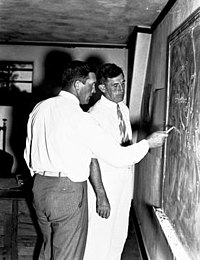Josh Cody
"Josh" Cody was a native of Tennessee and an alumnus of Vanderbilt University, where he earned 13 letters playing several sports.
[1] In 1969, Cody was named by the Football Writers Association of America to the 1869–1918 Early Era All-American Team.
[2] During the late 1950s, Cody was a seminal athletic director in the fight against racial segregation in sports, particularly in the southern US.
Cody was one of the early basketball coaches who could claim a personal relationship with Dr. James A. Naismith, the inventor of the game.
[1] His high school nickname was "Buff" because his surname reminded people of "Buffalo Bill" Cody.
[8] In 1914, at the age of 22, he enrolled at Vanderbilt University and was a member of the football, basketball, baseball, and track and field teams, earning a total of thirteen varsity letters.
"[10] Nashville Banner sportswriter and Vanderbilt alumnus Fred Russell described Cody: "When I think of Josh in his college days, I get a mental picture of this great big fellow playing catcher in the spring between innings running out beyond the outfield to throw the shot or the discus in his baseball uniform.
[n 1] In his second game, a 23–3 loss to Michigan in Ann Arbor, Cody converted a 45-yard (41.148 m) drop kick field goal.
[18] In his fifth game, a 20–7 loss to Virginia, Cody dropped back into the backfield and threw a touchdown pass to Irby "Rabbit" Curry, the team's regular quarterback.
[19] In 1915, Vanderbilt finished with a 9–1 record and a Southern Intercollegiate Athletic Association (SIAA) championship.
Cody earned his second national honor – a third team, All-America selection from Walter Camp.
In one of the greatest exhibitions of punt covering, Cody smothered the receiver every time, recovering two fumbles, including one across the goal line for a touchdown.
[28][n 4] He was elected captain of next year's team at season's end, but instead served in the U.S. Army during World War I as a lieutenant in 1917 and 1918.
[31] Cody again starred in the Auburn game, giving the SIAA champion its only loss on the year with a 15-yard fumble return and extra point to win 7–6.
The Mercer University Bulletin said of Cody: "No fairer, squarer athlete ever played a game, and when the final history of southern football is written the name of Josh Cody will stand as that of the greatest tackle that ever crossed chalk marks of Dixie.
[n 6] Cody's first year as an assistant on the football team in 1923 saw the last conference title for Vanderbilt in the sport to date.
[42] His 1926–27 basketball team finished 20–4—the best record in school history—and won the Southern Conference tournament championship.
Cody had a variety of superstitions while coaching his basketball team, including not laundering jerseys during a winning streak until a game was lost, and starting contests with the same lineup.
[44] Cody was popular with the Clemson student body, who called him "Big Man" because of his large stature.
[47][48] In May 1929, when rumors were swirling that he might leave to coach a bigger-name program, the students, faculty, and staff took up a collection to buy him a brand new black Buick automobile.
"[47] Cody and athletic director Mutt Gee were the impetus in building the Clemson Field House gymnasium.
[49] Fred Russell had a well-known story of Cody during a chicken-eating contest at Clemson with Herman Stegeman, the coach at Georgia.
Disappointed at being passed over for the Commodores' football head coaching job, Cody left Vanderbilt in 1936 and, with McGugin's help,[16] was picked by Edgar Jones to become athletic director and head football coach at Florida,[52] where he succeeded Dutch Stanley and compiled a poor 17–24–2 record in the four seasons from 1936 to 1939.
In 1955, after the sudden resignation of Albert Kawal, he served one year as Temple's head football coach, compiling an 0–8 record.
[3] In 1957 Temple's basketball team was integrated and had earned a place in the NCAA Tournament regional playoff in then segregated Charlotte, North Carolina.
Cody threatened to boycott the scheduled NCAA regional tournament game, saying "We will not go down there, if we cannot go as a team... eat together and be housed together.
[67] He died of a heart attack while feeding dogs at his son's nearby home[68] in Mount Laurel, New Jersey on June 17, 1961.
Former Vanderbilt quarterback Tommy Henderson said after learning of Cody's death: Josh was one of my closest friends until he went to Temple.



